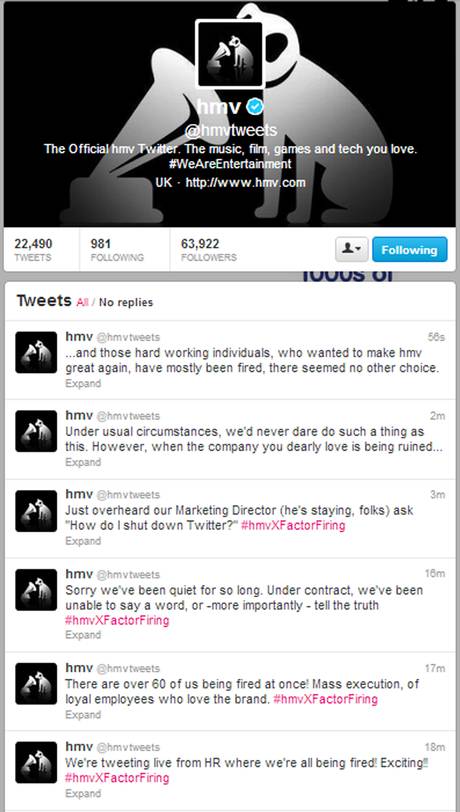In the U.K., collapsing retailer HMV went into administration and eliminated 190 jobs on January 31. What makes this story noteworthy is that the HMV community manager live-tweeted the “mass execution” to the Brand’s more than 61,000 Twitter followers.
Tweets like, “We’re tweeting live from HR where we’re all being fired! Exciting!” and “There are over 60 of us being fired at once! Mass execution of loyal employees who love the brand” have since been deleted when administrators were able to regain control of the Twitter feed, but, thanks to enterprising Internet citizens who captured screenshots, these tweets will live on in infamy. Community Manager Poppy Rose, age 21 as stated in her Twitter bio, was able to continue to tell her side of the story via her personal Twitter feed, where she has received messages from around the globe in support of actions.
Here are some suggestions to preempt ending up in a similar position provided by Ketchum’s James Donnelly, SVP, Crisis Management and Tyler Durham, partner and managing director, Ketchum Change:
- Include social media in all communications plans around major announcements.
- Recognize that the role of community manager is a powerful one and is not something that should be handed off thoughtlessly to an intern or to the most junior person in an organization.
- All site logins and password information for the brand’s community channels should be saved in a shared folder and accessible to senior management. Passwords should be changed frequently, particularly after staff turnover or changes in agency partners. Each time a change is made to login credentials, this document should be updated.
- Make sure community managers are aware of their personal liability, should they decide to “go rogue” with disclosures like this. HMV may have cause to sue Rose, even though that decision may be unpopular.
- Never rely on single community managers to be the sole voice for the brand – build redundancies that allow other voices to refute posts like these or add context.
- Have a contingency plan in place before incidents like this occur – this may include having alternate staff members trained on social media platforms and/or cultivating a well-established social media presence for a senior spokesperson so that they are well positioned to respond and tell the client’s side of the story.
- Establish company-wide social media guidelines and make sure they are communicated to employees clearly and consistently so they understand the company’s rules and regulations, regardless of their role.
As always, an ounce of prevention is worth a pound of cure, so I encourage you to proactively develop a social media and community strategy around all major announcements.



